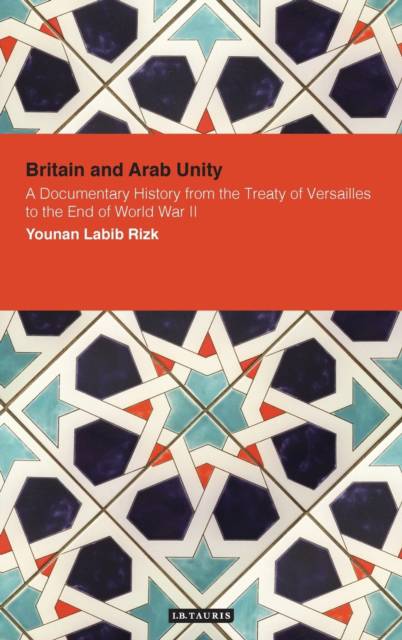
Door een staking bij bpost kan je online bestelling op dit moment iets langer onderweg zijn dan voorzien. Dringend iets nodig? Onze winkels ontvangen jou met open armen!
- Afhalen na 1 uur in een winkel met voorraad
- Gratis thuislevering in België vanaf € 30
- Ruim aanbod met 7 miljoen producten
Door een staking bij bpost kan je online bestelling op dit moment iets langer onderweg zijn dan voorzien. Dringend iets nodig? Onze winkels ontvangen jou met open armen!
- Afhalen na 1 uur in een winkel met voorraad
- Gratis thuislevering in België vanaf € 30
- Ruim aanbod met 7 miljoen producten
Zoeken
Britain and Arab Unity
A Documentary History from the Treaty of Versailles to the End of World War II
Younan Labib Rizk
€ 271,45
+ 542 punten
Uitvoering
Omschrijving
British attitudes towards Arab unity have frequently been a source of controversy. Younan Labib Rizk here provides a coherent Arab perspective derived from considerable in-depth research into British archives, covering the period 1919 to 1945. His analysis reveals how British government policy was formed in this period and concludes that repeated British administrations were consistent in their concern and hostility towards the notion of Arab unity. While this conforms with traditional Arab views of British policy in the Levant and the Arabian Peninsula, the importance of Rizk's work lies in his meticulous research through which he is able to document British attitudes and motivations. As he quotes the internal correspondence between departments and individual officials in the Foreign Office and its Eastern Department, the Colonial Office and several British Cabinets, Rizk shows that divisions within the Arab world - of which there were plenty - were nurtured by British officials, only eventually to acquire their own dynamic. This book enhances our understanding of how the international politics of the region evolved during a critical phase in the modern history of the Middle East.
Specificaties
Betrokkenen
- Auteur(s):
- Uitgeverij:
Inhoud
- Aantal bladzijden:
- 272
- Taal:
- Engels
- Reeks:
- Reeksnummer:
- nr. 2
Eigenschappen
- Productcode (EAN):
- 9781848850590
- Verschijningsdatum:
- 30/08/2009
- Uitvoering:
- Hardcover
- Formaat:
- Genaaid
- Afmetingen:
- 155 mm x 236 mm
- Gewicht:
- 566 g

Alleen bij Standaard Boekhandel
+ 542 punten op je klantenkaart van Standaard Boekhandel
Beoordelingen
We publiceren alleen reviews die voldoen aan de voorwaarden voor reviews. Bekijk onze voorwaarden voor reviews.











